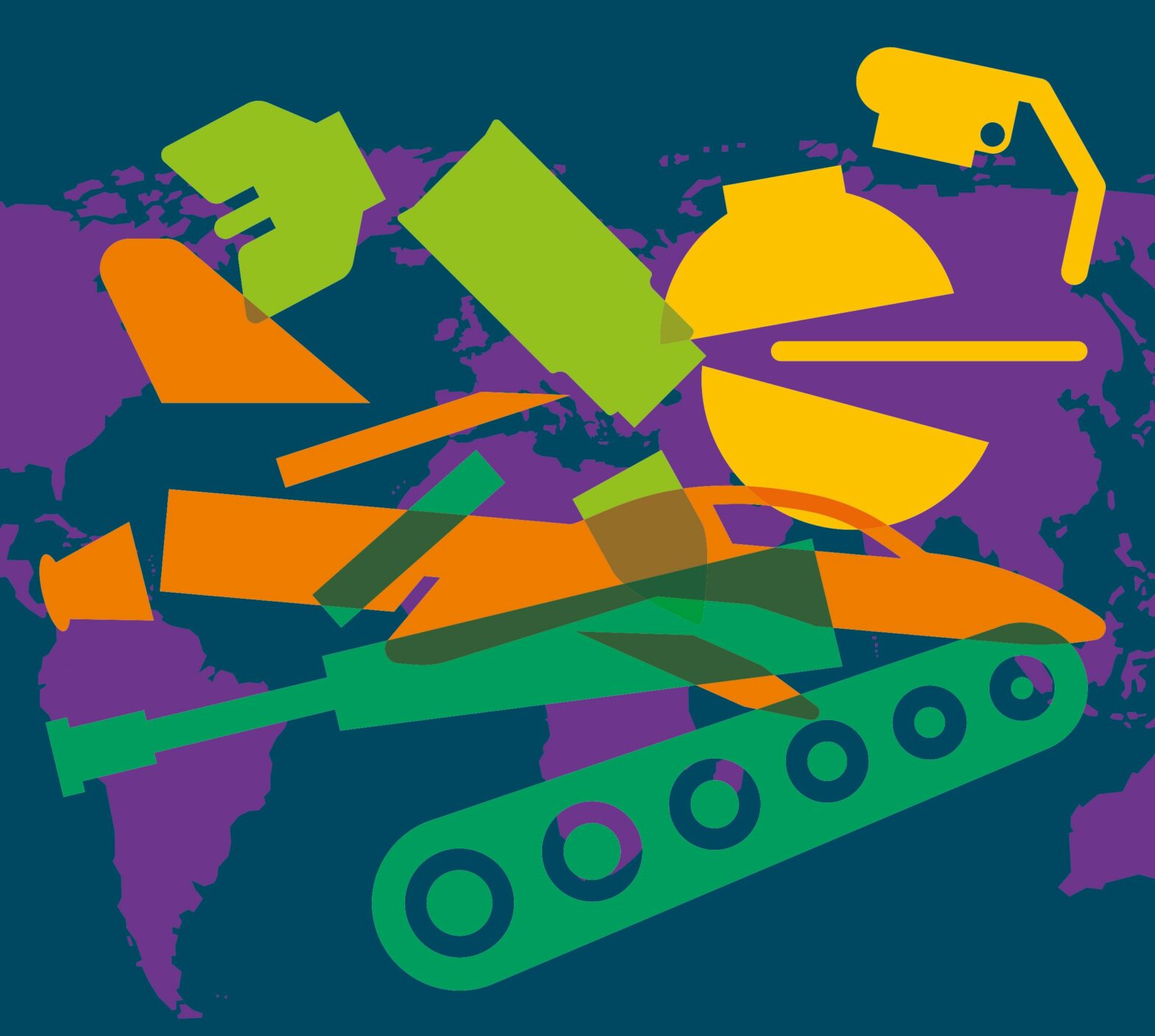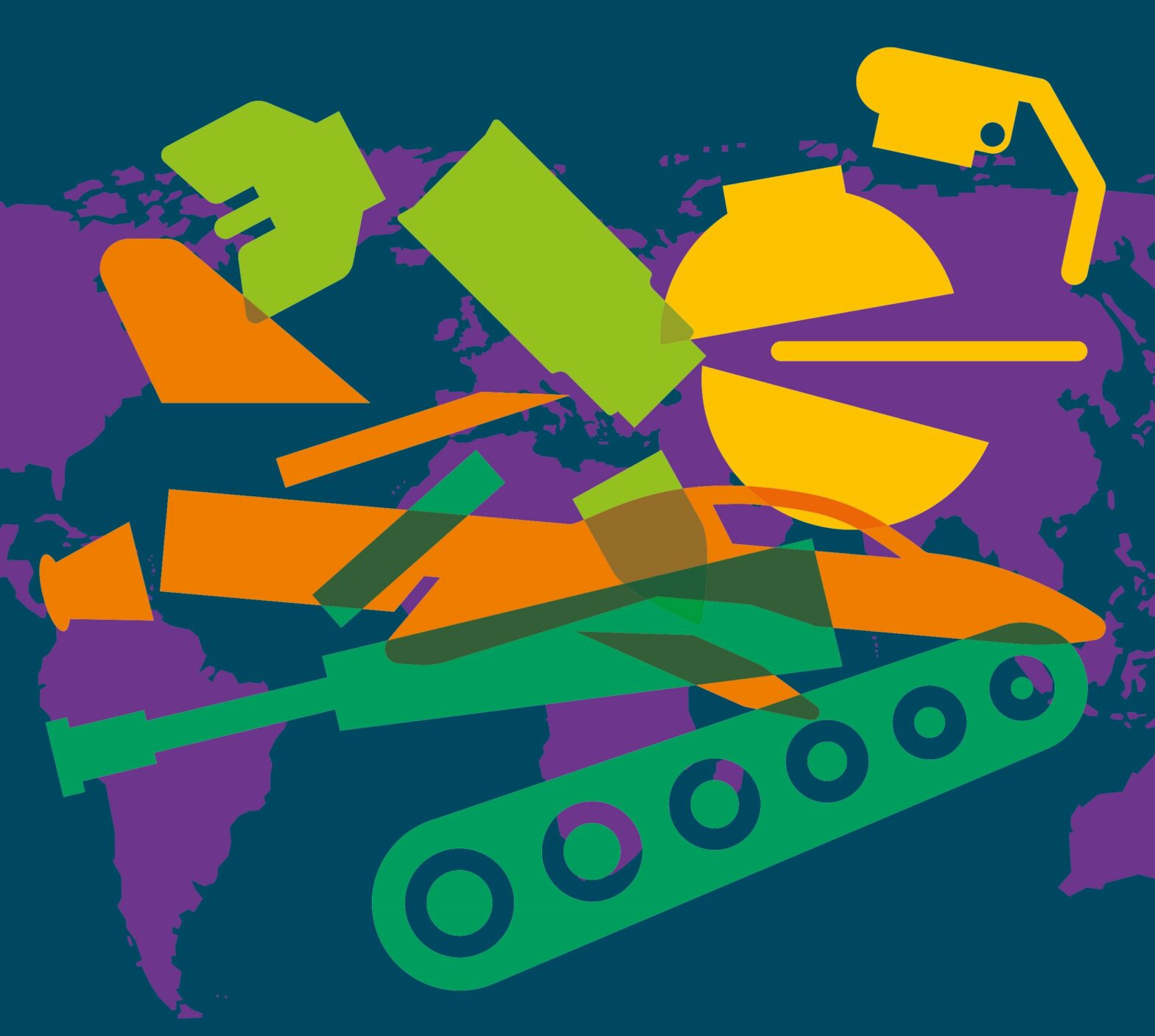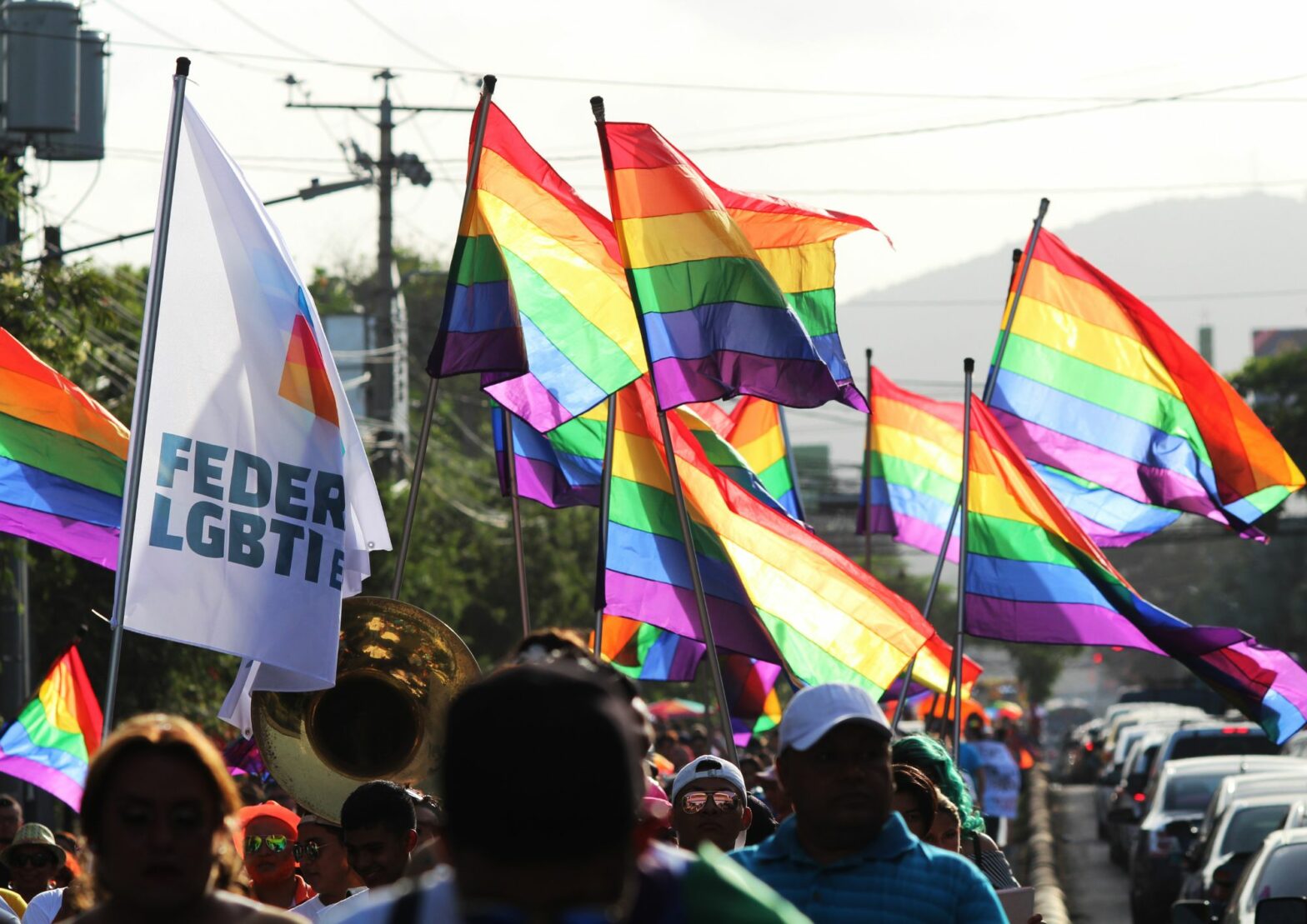Share Twitter Facebook Email Copy URL
Human rights are women’s rights are LGBTIQ rights are disabled rights are black rights (People of Colour) are rights of other groups
In the 1990s the phrase „Human rights are women’s rights“ became the war cry for women’s movements on both a national and international level. The saying picked up the feminist critique that Olympe de Gouge had already hurled at the declaration of human and civil rights shortly after the French Revolution: men’s rights, nothing but men’s rights. Women remain excluded due to their gender. The central theme of the first women’s movement in the West at the beginning of the 20th century was the exclusion of women from the right to vote. In 1945, when the UN Charter of Human Rights was being formulated, two Latin American feminists in particular, Minerva Bernardino from the Dominican Republic and the Brazilian Bertha Lutz, fought for linguistic inclusion, namely for the word ‘women’ to be included in the preamble. In all these struggles against often fierce opposition, it was first and foremost – as Hannah Arendt says – about the right to have rights.
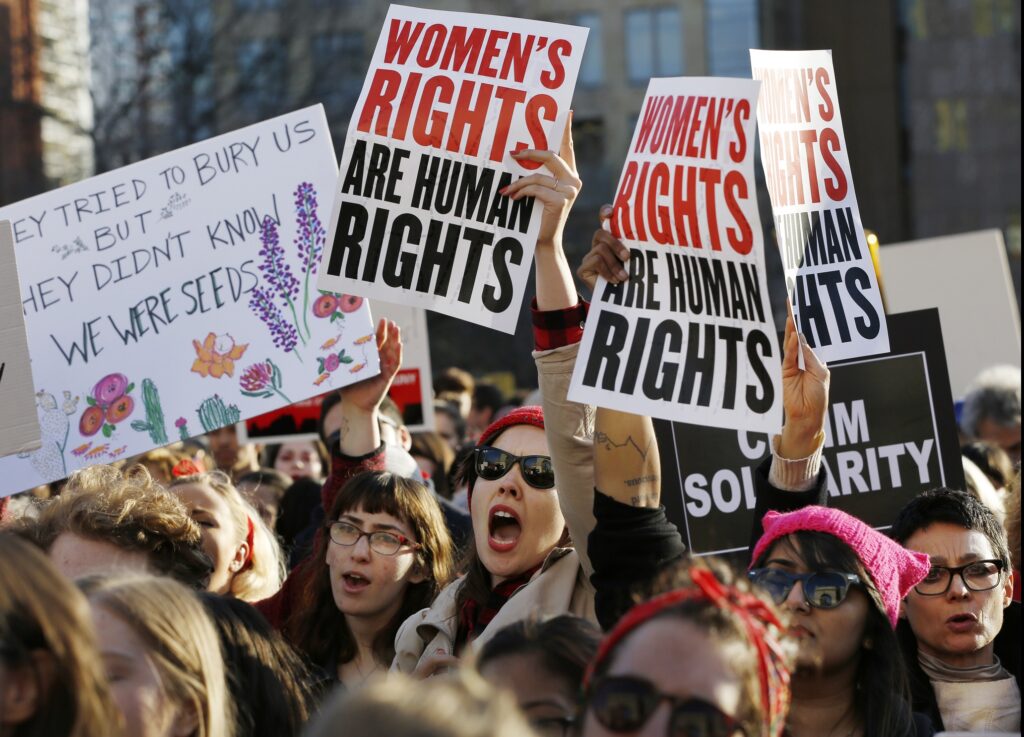
In the second half of the 20th century, legal activists based their feminist critique of law on the contradiction between the legal norm of equality widespread in constitutions and political programmes and the legal reality of inequality. The double structure “Human rights are women’s rights” and “Women’s rights are human rights,” means that justice cannot be achieved through equality alone, but that special rights for women are necessary. The 1979anti-discrimination convention (CEDAW), the only binding document on gender equality under international law, contains a prohibition of discrimination and a requirement of equal treatment to oblige states to perform a threefold task: to respect, protect and to actively honour women’s rights as human rights. CEDAW contributed decisively to the internationalisation of the statement that women can claim universal human rights and gender specific women’s rights for themselves.
The references to the human rights paradigm became a major success in the 1990s. On the one hand, it made women’s policy connectable to UN policy, and on the other hand, it provided common normative reference points for very different women’s movements from the various continents and cultures. The women’s/human rights concept is based on the indivisibility, interdependence and equal value of three generations of human rights: civil-political rights, economic, social and cultural rights, and the collective rights to peace, sustainability, a healthy environment, etc. have been considered as “key areas of power” in the context of a women’s empowerment strategy (David Held). They represent a set of instruments with the help of which women can negotiate their relationship to the state on the one hand, but also to their culture and traditional legal and value systems on the other.
This led to a new self-perception: women now appeared as autonomous legal subjects, no longer primarily as petitioners and needy citizens as had been the case in the development discourse since the 1970s.In this way, it became possible to make injustice to women and as such power relations visible, but at the same time to overcome the victim role. The paradigm shift from a basic needs to a basic rights approach led to a shift in emphasis in the concepts of political action: now demands for political fulfilment of legal rights and for participation in shaping politics and democracy, economics, development and peace were paramount.
The substantial new element in the feminist redefinition of human rights was that the private is political, in essence an extension of the human rights concept from the public into the private sphere. This legal understanding allowed them to break up the male-patriarchal sovereignty of discourse and appropriated the power of interpretation and definition in society. This has been concretised since the UN Human Rights Conference in Vienna in 1993: since then, violence against women has been named as a human rights violation and rape in war as a war crime. The formulation of sexual and reproductive rights opened up the possibility of a new chapter of self-determination over the body, sexuality and reproduction.
All this came along at the UN level with the claim of universality and implied a common gender identity for all women that makes worldwide women’s solidarity possible.
Human rights and anti-feminist critique
Whenever women’s rights were negotiated in the United Nations, conservative forces from different regions, religions and cultures articulated opposition to the concept of gender equality. Led by the Vatican, an “unholy” alliance formed between reactionary forces in Christianity and Islam. They assigned absolute priority to the family, heterosexual marriage and the role of mother over the self-determination of women and LGBTIQ persons, to the biological difference of the two sexes over social construction. These conservative currents reject sexual and reproductive rights, from children’s rights to sexual education to free decision on sexual orientation to the right to abortion. Religious norms thus became superior to general human rights.
Fundamentalist religious forces from different world regions have mobilised social movements to a massive backlash against emancipatory accomplishments by women and LGBTIQ persons in the past two decades. The World Congress on Families played a leading role in the process, driving traditional gender-role feminism and reactionary Christian groups against right-wing populist civil society forces and right-wing political parties.
Arguments against women’s individual freedom and equality rights were not only justified with religion, but often with the “own“ culture and with ”authentic“ own values and morals: as such women with short skirts do not allegedly belong in the “African” culture, and face covering using a hijab allegedly does not belong to the Swiss culture. The construction of a sovereign own culture is positioned as the highest standard and relativises human rights.
Culture relativistic and religiously motivated ways of thinking also play their part in right-wing populistic, authoritarian and nationalist ways of thinking and in current anti-feminism. The conflicts have escalated to a cultural struggle about the definition sovereignty over gender, family and social order. The central reproach directed at feminist and queer claims for sexual and reproductive rights and individual freedom of choice is that it would undermine the “natural” or even God-ordained order of bisexuality, patriarchy and heterosexual marriage. The underlying normative conception of humans is that of the white male citizen. This based on the assumption of “natural” human inequalities, which legitimizes the social hierarchies along gender, ethnicised and racialised categories. Therefore, egalitarian and inclusion policies towards those defined as “different” are questioned and it is claimed that women’s rights and equality are already sufficiently implemented. These different tendencies lead to a rollback against gender rights and target the exclusion of others, specifically of migrants or ethnic minorities from human rights based on a simplified contrast of “we” and the “others”, of West and East, of North and South. This is supposed to silence the rights claims of the others.
Human rights and post-colonial critique of power
As Olympe de Gouge argues in 1791 that the human and civil declaration was written from a privileged male position of power, post-colonial critics now argue that the human rights were written from a position of power and privilege power from Western Enlightenment and its white male philosophers. In this respect the paradigm always represents the superiority of Western rationalisation and modernity in reference to individual freedom and equality. Values and knowledge from the Enlightenment and bourgeois liberal democracy in this context become technologies of domination over the Global South, the “others”. This also legitimises colonialism and (neo)-colonial development, which was always the business model of the West, as a civilising mission.
The well-known post-colonial theorist Gayatri Spivak therefore also announced her alliance with women from the North at the UN conferences of the 1990s: “I am not a sister”. The “hegemonic” feminists became agents of an “imperial project” that silenced the voices of the subalterns because it always believed it represented others.
The reproach from the post-colonial critics targets the idea that Western feminists selectively construct “other”, non-Western women as passive victims of poverty, violence, patriarchy, war, (natural) disasters and “underdevelopment”. Through cultural or racialised attribution, power asymmetries and relations of domination are thus cemented and characteristics are generalised and naturalised as the essence, the essential of human beings. This facilitates the establishment of social inequalities using social identity categories on a global scale. In such unequal relations – according to the argument from a post-colonial perspective – solidarity at eye level is not possible. It again confirms the superiority of the allegedly more emancipated white middle-class feminists and sets their privileged position as a standard. Just as feminists have responded with identity politics to the exclusion of human rights and discrimination based on gender identity, women from the Global South, LGBTIQ, female migrants, Dalit, indigenous, black and disabled people are responding with a variety of identity politics to identity-based discrediting and strategies to liberate and rescue the poor backward and battered women from their patriarchies.
Feminist forces in the West misuse the defence of women’s rights for geopolitical, foreign policy and security purposes, as the “war on terror” in Afghanistan paradigmatically showed. At that time, the US military intervention was justified with the protection of women’s rights as a humanitarian and moral intervention, as a “just” war, so to speak, to protect Afghan women from Taliban violence. At the same time, the USA has to this day not ratified the Women’s Rights and Children’s Rights Conventions because it considers its national legislation as sufficient or better suited to defend and implement women’s and children’s rights. In relation to the “others”, implemented in their own country are turned in a femo- or homonationalist way by once again using their own progressiveness with a neo-colonial moral gesture against “backward” positions in other cultures.
Another appropriation of human/women’s rights takes place in the markets: gender equality means “smart” economics according to the World Bank. For decades, the World Bank has been ensuring that the „underused“ female human capital on the neo-liberal markets should have more equal rights and chances to promote growth and productivity. Discrimination and exclusion pose an obstacle to growth. This market logic was assumed by business feminists in their demand to see women in the top business jobs and in management positions. In turn, Nancy Fraser criticised this as an unfortunate combination of neo-liberalism and feminism. In this context, market rights with the label of equality appear as new human rights, e.g. a human right to microcredit.
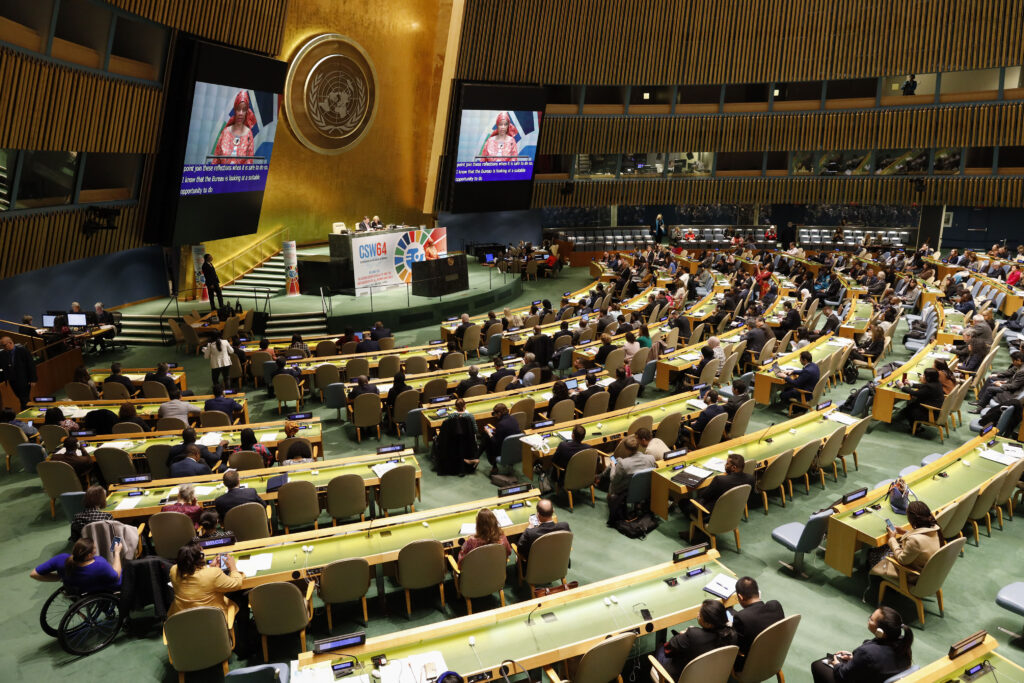
Human rights are (also) the rights of others
Human rights are not static, but have overcame the binary gender concept and identitarian women’s politics a long time ago. The concept has experienced different dynamics of opening and closing. Does the paradigm of human rights have to change if it is to be just in different contexts? How can it be universal and yet do justice to diverse differences and identities? It is still true that when unequal get equal rights, opportunities and treatment, inequalities increase. For every generalisation and conveyance it must always be taken into account that a Eurocentric, gendered and racialised conception of humanity is deeply inscribed in human rights.
The further development of the concept on global social rights meets with the capabilities approach by Martha Nussbaum, which does not decisively come from a certain conception of humanity, but from anthropological commonalities. It aims at the creation of agency and conditions to achieve a good life and an empowerment of women and other marginalised groups, those discriminated against and those excluded as autonomous legal entities. Gayatri Spivak, who critically confronts human rights as Eurocentric and imperialistic constructions, argues that Western Enlightening legal thinking, which is based on rationality and contract, should be complemented by thinking on justice that is based on the responsibility for the others, the subalterns and for their agency. The central theme is that with the help of the human rights paradigm, victim status can be overcome, intersectional injustice can be politicised and inequalities and power asymmetries can be overcome.
It is exactly this field of action where the struggles for human rights, global social rights and identity-based rights are interwoven and inseparable in many places.
Christa Wichterich is a scholar activist and feminist sociologist from Germany who spent many years of her professional life working in India and East Africa. In the 1990s she followed the series of UN conferences as a journalist, author of books and researcher. Lately she worked at universities in Germany, Austria and Switzerland as a guest professor for gender politics.
